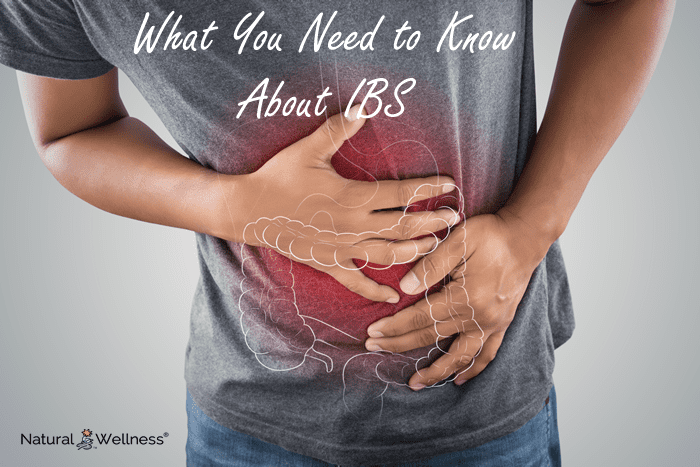What You Need to Know About IBS

Discover what you need to know about Irritable Bowel Syndrome (IBS), including its causes, foods that trigger it, as well as how you can manage this condition.

April is IBS Awareness Month.
IBS is short for irritable bowel syndrome and is a condition that is thought to affect between 10% and 15% of adults in the United States. Although, only half of these individuals are formally diagnosed while the other half are not. (1)
If you’re concerned that you or someone you love might have IBS, here’s what you need to know.
What is IBS?
IBS is a gastrointestinal order affecting the large intestine. It is characterized by frequent bouts of abdominal distress. With IBS, the digestive tract is more sensitive than it normally would be. This causes the muscles in the bowel to contract, creating both discomfort and issues with waste elimination. The latter generally appears via either diarrhea or constipation.
There are four types of IBS:
- IBS-D – abdominal discomfort combined with diarrhea
- IBS-C – abdominal discomfort combined with constipation
- IBS-mixed – abdominal discomfort and alternating bouts of diarrhea and constipation
- IBS-U – varied IBS symptoms
What Age Does IBS Usually Start?
Generally, IBS appears early in life, with many patients experiencing symptoms during childhood, or at least well before they reach 40 years of age. (2) IBS diagnosis rates are reduced by 25% in individuals who are older than 50, even though this age group can still develop this condition, ultimately reducing their quality of life. (3)
Causes
Research suggests that IBS may be at least partially genetic. (4) But several other factors appear to also contribute to the development of this condition, some of which include: (5)
- muscular contraction dysfunction in the intestines
- poor gut-brain communication
- changes in the gut microbiome
- infection or virus
- exposure to high-stress situations, especially early in life
What Are the Warning Signs of IBS?
While some health conditions can develop without any noticeable symptoms, IBS often appears in the form of frequent bouts of gastrointestinal discomfort. This includes experiencing gas, bloating, abdominal cramping, and pain.
A change in bowel habits—such as by having diarrhea, constipation, or a mixture of both—can also be a warning sign of IBS. These symptoms can feel either mild or severe and are often made worse when experiencing higher levels of stress or anxiety.
Diagnosis

To diagnose IBS, your healthcare provider will typically ask about your symptoms (including their length and severity), and whether there is a history of this condition in your family. A physical exam may also be conducted to determine if any abdominal bloating exists while also listening to abdominal function through a stethoscope and tapping the area to identify areas of tenderness or pain.
Additional tests may be conducted to rule out other conditions or diseases.
Some of these testing options include: (6)
- blood test
- stool test
- hydrogen breath test
- upper gastrointestinal (GI) endoscopy
- colonoscopy
Treatment Options
Technically, there is no cure for IBS. However, this condition can often be successfully managed with the help of dietary changes, medication, psychotherapy, and alternative therapies such as acupuncture, therapeutic massage, and probiotics. (7)
In the case of probiotics, taking a supplement may help. For instance Super Probiotics and Ultra Probiotic Formula both of provide eight different probiotic strains.
Your healthcare provider can help determine the best treatment approach for you. If you have a lot of intestinal cramping, they may prescribe a medication that helps relax the muscles in the intestine. If symptoms are worsened by emotional stress, a low-dose antidepressant and/or psychotherapy may be recommended instead.
How to Help Manage IBS
Making changes to your diet can often go a long way in managing IBS. One change that can be helpful involves following a low-FODMAP diet. (8) FODMAP stands for fermentable oligosaccharides, disaccharides, monosaccharides, and polyols.
With a low-FODMAP diet, you limit your intake of these foods containing these substances to keep from further upsetting your digestive tract.
Foods that are limited include:
- dairy products that contain lactose
- fruit such as apples, pears, cherries, peaches, and plums
- vegetables such as artichokes, Brussels sprouts, cauliflower, and snow peas
- chickpeas, lentils, and kidney beans
- soy products
- grains such as wheat and rye
- sweeteners such as agave nectar, honey, and those found in sugar-free products
What Foods Usually Trigger IBS?

Just as it is important to know which dietary changes can help ease IBS, it’s equally important to realize which foods can exacerbate this condition.
Here are five foods that can trigger IBS: (9)
- all dairy products except yogurt
- high-fructose foods, both processed and natural (such as fruit like apples and pears)
- carbonated beverages
- caffeine
- sugar-free chewing gum
Avoiding these items can help keep IBS symptoms from occurring, reducing incidents of gastrointestinal discomfort.





